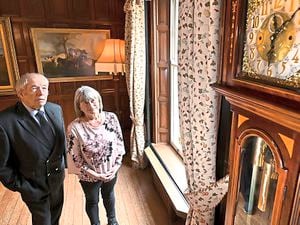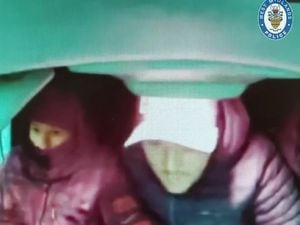IN VIDEO and PICTURES: Farmer's fly-tipping nightmare growing
Sheets of asbestos lie alongside dirty mattresses, broken beds, chairs, a fridge and a discarded suitcase.
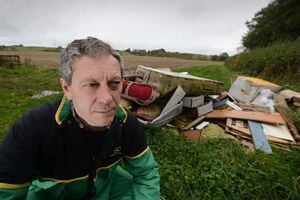
Not far away are two battered sofas, another mattress, bits of carpet, a smashed TV stand and the remains of some cupboards.
The eyesores are an all too familiar sight to 50-year-old Chris Inett since his land became a makeshift rubbish dump targeted by fly-tippers.
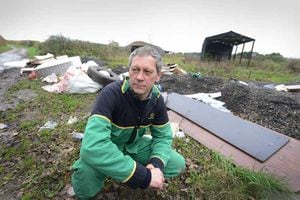
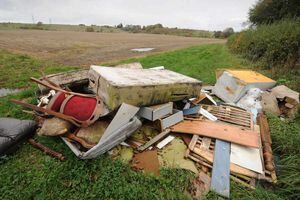
They litter the 550 acres his family has farmed at Furnace Grange, Trescott on the outskirts of Wolverhampton since 1934 - and he fears there is little or nothing he can do to stop it.
Mr Inett became so frustrated he once took the law into his own hands and dumped 150 tyres left by somebody else on his land.

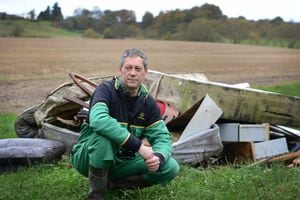
In June, he was fined £2,000 by magistrates after admitting fly tipping but the total bill was nearly £5,000 when court and his legal costs were added.
Estimates suggest it would cost him around £500 a month to have the mounds of refuse moved to proper dumps because he cannot get a licence to transport and dispose of it himself - even if he had the time to do so.
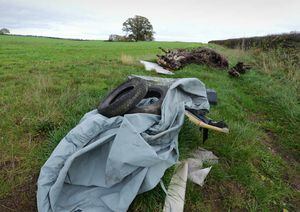
Mr Inett explained: "We have a huge problem with fly-tipping. People dump everything from fridges, settees and sofas to garden waste, builders rubble and even the remains of cannabis farms.
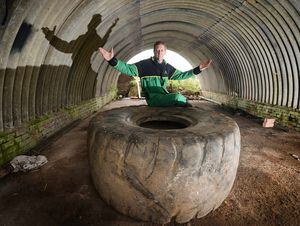
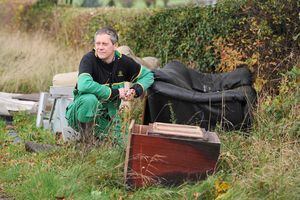
His family farm in Trescott on the outskirts of Wolverhampton has become a fly-tipping hotspot.
Not a month goes by without rubbish being dumped on his land.
This includes sofas, beds, fridge-freezers, and even asbestos.
At the end of his tether, he removed 150 tyres that had been dumped on his land and left them by the side of the road. It was then Mr Inett who was punished.
He was fined £2,000 and the total bill came to nearly £5,000. He knows what he did was not right, and he has rightly accepted the punishment.
Indeed, no-one is above the law. But he has a point when he says the law needs to be changed.
It is simply unfair that innocent landowners should be expected to foot the bill for illegal dumping.
It was too easy for the local authorities to punish Mr Inett rather than trying to find the real culprits.
Council officers can simply throw their hands up in the air and say it is not their problem because the fly-tipping took place on private land.
They clearly have a role in creating a deterrent to fly-tippers and investigating them.
It is estimated it would cost Mr Inett £500 a month to move the refuse because he would be prohibited from taking it to normal tips because of a litany of red tape.
In the case of the dumped asbestos, he is not even legally allowed to remove it. Fridge-freezers also require special disposal.
Councils should be helping victims of fly-tipping by making things easier for them.
Similarly, local authorities should not underestimate the role that cuts to tips and recycling centres' opening hours have had.
Of course, fly-tipping can never be condoned and excuses about tip closures are not a valid reason.
But we have to face the harsh reality that they are likely to be contributing to the problem.
It is also incumbent on local authorities to monitor unscrupulous businesses who may be dumping waste to sidestep disposal charges.
Fly-tipping is a menace. It makes our communities look a mess and attracts rodents and pests. Hazardous materials pose a public health risk.
"The council will not help us remove it because it is on our land and so it is our problem to solve even though it was not our rubbish in the first place.
"Commercial vehicles are not allowed at normal household tips and my pick-up truck would need a licence that would not allow a sufficient number of visits to get rid of all the stuff. Just one of the mattress would fill the back of it."
His fields sit alongside country lanes with neither fences nor hedges to separate them from the grass verge and the cost of erecting barriers would be prohibitively expensive.
Mr Inett said: "Fly-tipping breeds more fly-tipping because once someone sees stuff dumped at a spot they think it is all right to add their junk to it but it is not all right if it is somebody else's land."
The problem came to a head at the start of the year when three massive loads of tyres were dumped at the farm in quick succession with two of them blocking an access track.
Frustrated Mr Inett used a fork lift truck to load them up and leave them in Bennetts Lane, a rugged stretch of road running alongside one of his fields that can only be navigated by a 4x4.
The council knew he was to blame because he had earlier asked them to remove the tyres. The case cost him dear and he had to pay a further £500 for the tyres to be removed professionally although the biggest tyre still remains on his land as an unwanted souvenir because he refused to pay the extra £150 demanded to shift it.
"I feel pretty hard done by but admit that what I did was wrong," continued Mr Inett. "I feel sorry for the problems the council face in prosecuting fly-tippers unless they are caught red handed. But now my hands are tied. The fly-tipping is getting worse and there is nothing I can do about it.
"I would like to be able to get rid of it responsibly and legally without having to pay a fortune because none of this rubbish is mine.
"There needs to be a change in the law to make it easier for people like me to do the right thing. It just does not seem fair the way things work at the moment."


